Freeze-proof cattle waterers are essential tools for livestock management, ensuring consistent water availability in cold climates. These specialized waterers use innovative features like insulation and heating to prevent freezing. By offering reliable water access, they play a pivotal role in maintaining cattle health and productivity year-round.
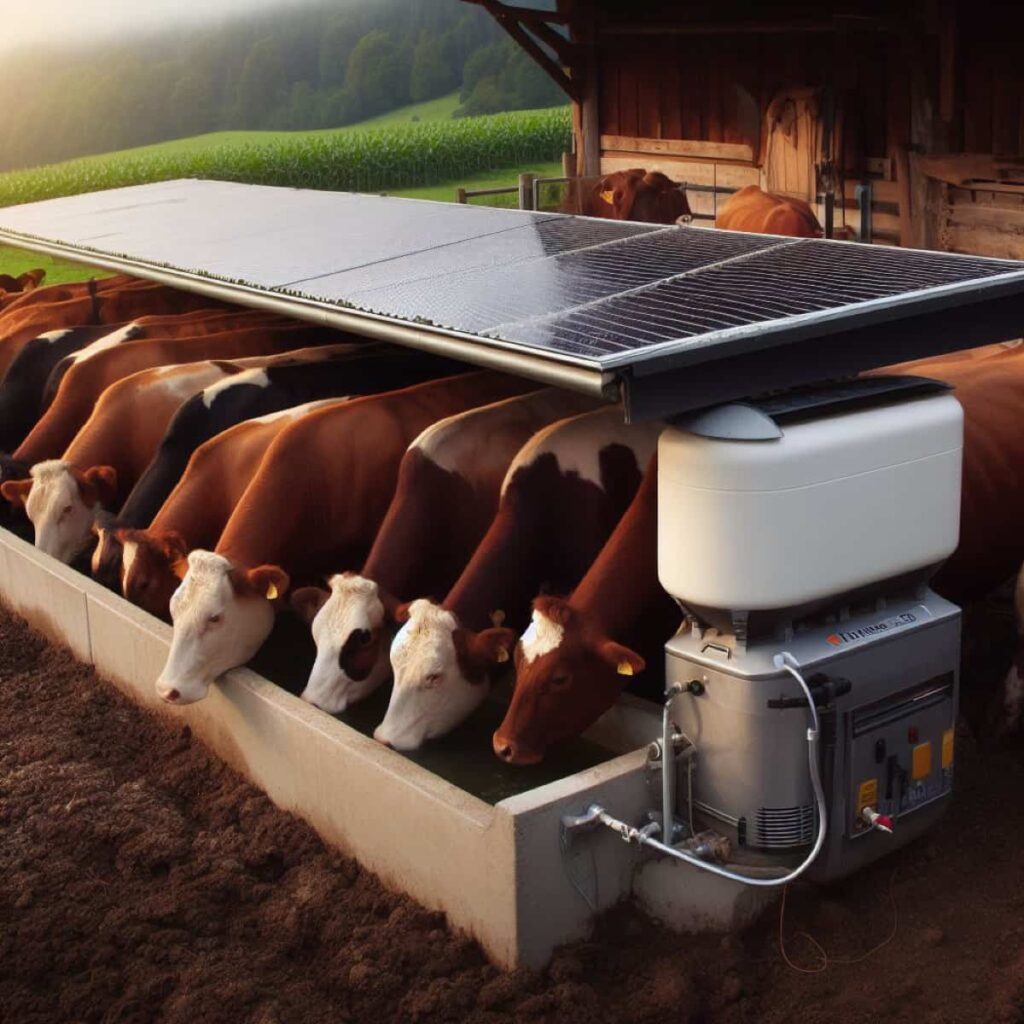
All You Need to Know About Freeze-proof Cattle Waterers
Features and Benefits of Freeze-proof Cattle Waterers:
Freeze-proof cattle waterers are innovatively designed to provide a consistent supply of fresh water to livestock, even in freezing temperatures. These waterers are often well-insulated and may come equipped with built-in heating elements to prevent water from freezing, ensuring that cattle have uninterrupted access to water. Additionally, their durable construction is meant to withstand harsh weather conditions, enhancing longevity and reducing maintenance needs.
Some models also feature automatic refilling, thermostatic controls, and energy-efficient designs, contributing to their overall functionality and effectiveness in supporting livestock hydration and health. By optimizing water availability, freeze-proof cattle waterers play a crucial role in promoting animal well-being and productivity on the farm.
Choosing the Right Freeze-proof Cattle Waterer for Your Farm
Choosing the right freeze-proof cattle waterer involves considering various factors such as the size of the herd, climatic conditions, and installation capabilities. A good quality waterer, such as a concrete livestock waterer, offers durability and is more resistant to harsh weather, ensuring that it can withstand the environmental conditions of your area. DIY freeze-proof cattle waterers provide a level of customization that allows you to tailor-make the waterer according to specific needs and preferences.
In case you missed it: How to Start Sustainable Dairy Farming: Benefits and How to Reduce Your Carbon Footprint With Dairy Cattle
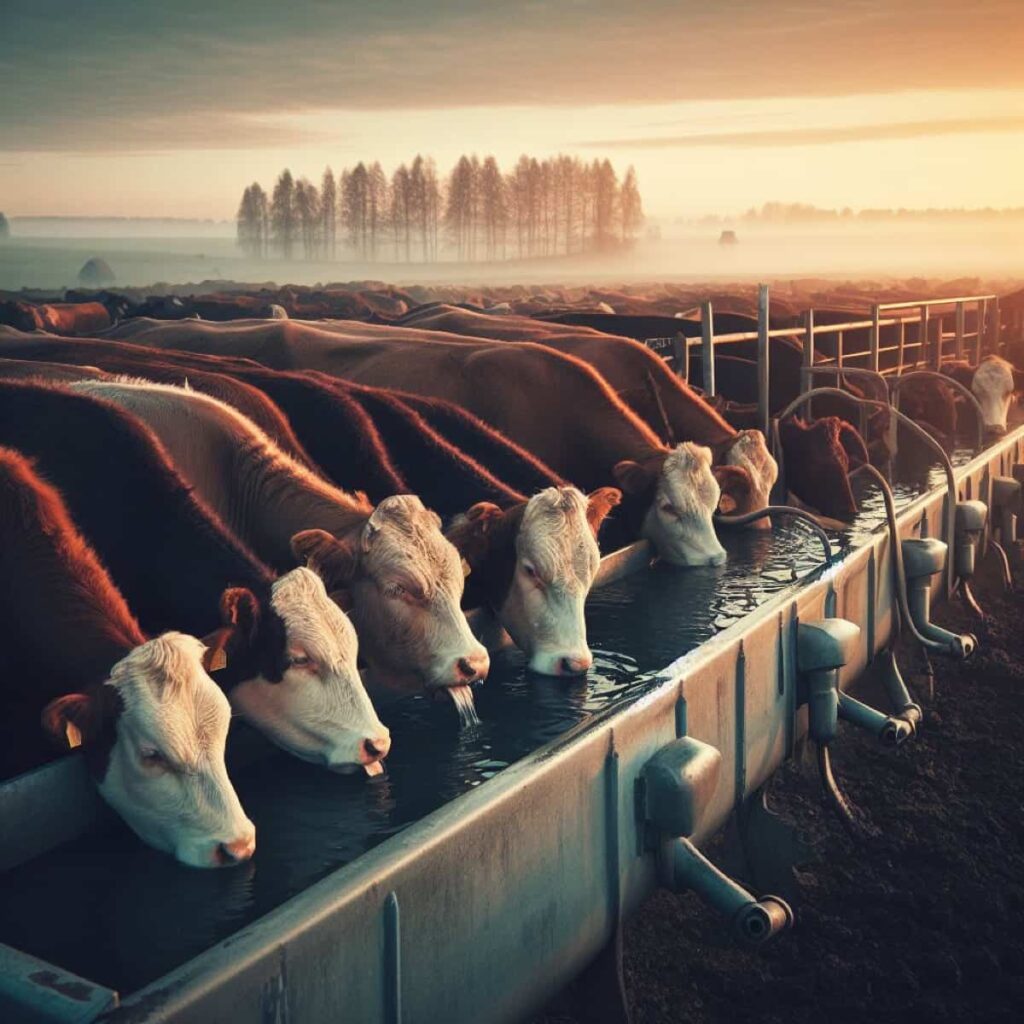
While deciding on the type of waterer, consider the automatic livestock waterer installation process and whether it aligns with the infrastructure of your farm. The best freeze-proof cattle waterer would not only prevent water from freezing but also suit the specific needs and conditions of your farm, ensuring that it is a practical and sustainable solution for ensuring that your cattle have continuous access to water.
Installation Guide for Freeze-proof Cattle Waterers: Step-by-Step Process
When installing freeze-proof cattle waterers, there are several key steps to ensure that the system works effectively. Begin by selecting a suitable location that is easily accessible to all cattle and has a power and water source nearby. Ensure the automatic livestock waterer installation instructions the manufacturer provides are followed accurately to prevent future drinking post-waterer problems.
If you’re setting up concrete freeze-proof cattle waterers, ensure that the base is secure and level, as this will enhance the durability and functionality of the waterer. For the best freeze-proof cattle waterer performance, ensure that all components, such as heaters and insulation, are installed correctly. If there are any challenges or uncertainties during installation, seeking professional advice or assistance can ensure the system is set up effectively to function optimally.
Maintaining Freeze-proof Cattle Waterers: Tips and Best Practices
Maintenance is crucial for the optimum functioning of freeze-proof cattle waterers. Regular cleaning ensures the water is always fresh and safe for cattle consumption. Inspecting the heaters and other components periodically is necessary to ensure they are functioning correctly. Checking for cracks or damages caused by freezing and thawing cycles is crucial for concrete livestock waterers.
Troubleshoot any drinking post-water problems immediately to prevent disruptions in the water supply to the cattle. By doing these maintenance steps, your freeze-proof cattle waterers will last longer and work better, making sure they keep serving your cattle well.
Comparing Different Types of Freeze-proof Cattle Waterers: Pros and Cons
Comparing different types of freeze-proof cattle waterers is essential in making an informed decision. Concrete freeze-proof cattle waterers are durable and resistant to harsh weather, but they might be challenging to move or relocate. DIY freeze-proof cattle waterers offer flexibility and customization but may require more effort in setting up and maintenance. Some waterers have advanced features for automatic livestock waterer installation, simplifying the setup process, but they might be costlier.
In case you missed it: Common Dairy Cattle Diseases, Symptoms, and Treatment: Check How this Guide Helps Dairy Farmers
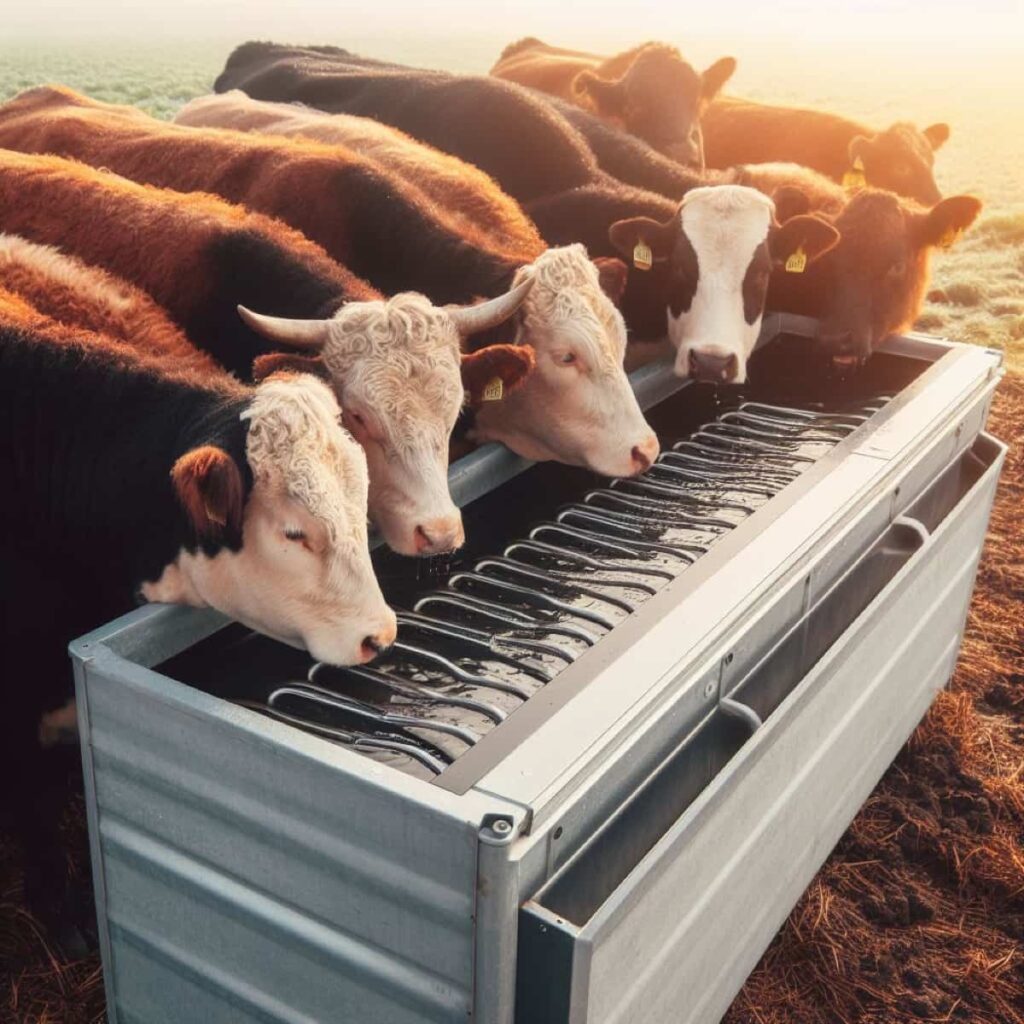
How Freeze-proof Cattle Waterers Prevent Water from Freezing in Cold Temperatures
Freeze-proof cattle waterers operate using various mechanisms to prevent water from freezing, ensuring that cattle have continuous access to fresh water, even in cold temperatures. Firstly, they are usually insulated to conserve the heat within the water and prevent it from reaching freezing temperatures. Some waterers use electrical heating to keep the water warm and prevent freezing.
These elements are submerged in the water or installed in the walls of the waterer, providing consistent warmth necessary to prevent ice formation. Others utilize the ground’s natural heat by installing the water supply lines below the frost line, tapping into the warmer temperatures beneath the surface to prevent the water from freezing.
Factors to Consider When Selecting a Freeze-proof Cattle Waterer
When selecting a freeze-proof cattle waterer, various critical factors must be considered to make an appropriate choice suitable for your cattle and environmental conditions. One primary consideration is the climate; the waterer must be robust enough to withstand the lowest temperatures in your area. Next, consider the size and type of your herd. Different waterers are suited to various animals, and the waterer should be able to accommodate your herd’s water consumption needs effectively.
The ease of installation is also essential; some waterers come with features that facilitate automatic livestock waterer installation, simplifying the process. It’s also important to consider the waterer’s durability and ease of maintenance to ensure that it remains functional and effective over time. Finally, consider the availability of power sources, as some freeze-proof cattle waterers require electricity to operate heating elements, while others might utilize gravitational or geothermal heat.
Tips for Insulating Freeze-proof Cattle Waterers to Enhance Efficiency
Insulation is a critical aspect of enhancing the efficiency of freeze-proof cattle waterers. Effective insulation helps maintain the water temperature, preventing it from freezing in cold weather. One practical tip is using materials like foam or straw around the waterer to prevent heat loss, ensuring the water remains warm for longer periods. Another suggestion is to limit the amount of water exposed to the cold by using covers or lids that protect most of the water from direct exposure to freezing temperatures.
It’s also helpful to install the waterers in locations less exposed to cold winds or where natural barriers, such as buildings or trees, can shield them from the cold. Regularly checking and maintaining the insulation materials to ensure they are in good condition and effectively preventing heat loss is also crucial in maintaining the efficiency of the freeze-proof cattle waterers.
Common Issues with Freeze-proof Cattle Waterers and How to Troubleshoot Them
Various issues can arise with freeze-proof cattle waterers, but with the right troubleshooting strategies, they can be resolved effectively. One common problem is the failure of heating elements, which can be checked by ensuring they are correctly connected to a power source and functioning as intended. For issues such as leaking or overflowing, it’s important to inspect the valves and adjust them as necessary to prevent water wastage.
In case you missed it: Sheep Milk Production: Lactation Period, Uses, Benefits, Price, and Dairy Sheep Breeds
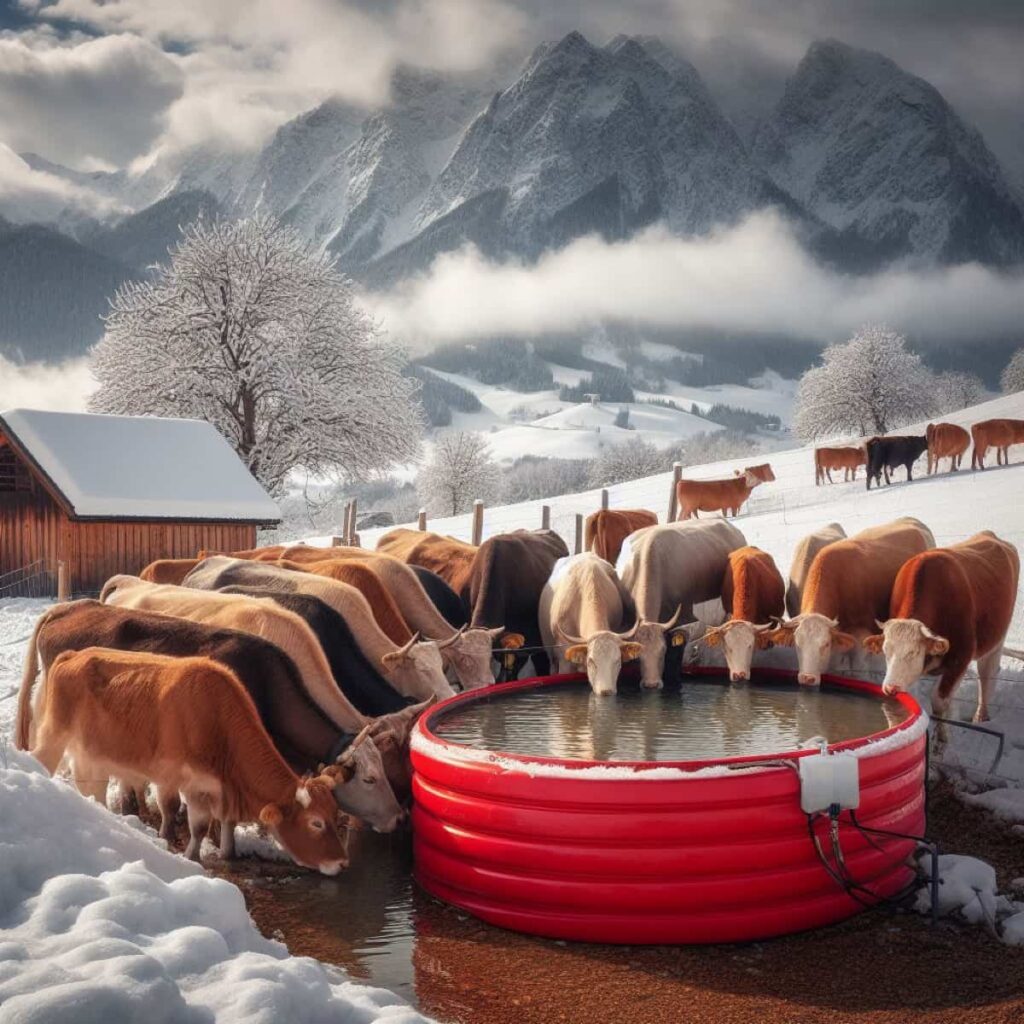
Blockages or frozen pipes can also be a common issue, and these can be prevented by ensuring that the pipes are adequately insulated or heated. Regular maintenance and cleaning of the waterers can also prevent many problems, such as dirty water or algae growth, ensuring the water remains clean and fresh for the cattle. Understanding and identifying common drinking post-waterer problems can lead to effective troubleshooting and maintenance, ensuring that the waterers remain functional and reliable.
The Importance of Regular Cleaning and Sanitization of Freeze-proof Cattle Waterers
Regular cleaning and sanitization of freeze-proof cattle waterers are paramount in maintaining the health and well-being of cattle. Clean waterers ensure that the water consumed by the livestock is free from contaminants, bacteria, and algae, which could cause health problems in the herd. Regular cleaning helps prevent the buildup of minerals and other deposits that may affect the water’s functionality and quality.
A sanitary waterer also discourages the breeding of pests and spreading diseases, ensuring the cattle have a hygienic water source. Besides promoting animal health, regular cleaning and sanitization practices enhance the overall durability and performance of the freeze-proof cattle waterers, ensuring they operate efficiently and effectively over a more extended period.
Energy-Efficient Options for Freeze-proof Cattle Waterers: Saving Costs and Resources
Energy-efficient options for freeze-proof cattle waterers are an excellent investment that can substantially save costs and resources over time. These waterers are designed to minimize energy consumption while effectively preventing water from freezing. Utilizing well-insulated materials and innovative designs, these waterers conserve heat, reducing the energy required to keep the water above freezing temperatures. Some models harness natural heat sources such as geothermal energy or solar power, reducing dependency on electrical power.
Opting for waterers with adjustable thermostats or timers also contributes to energy efficiency, as they enable precise control over heating, ensuring that energy is used only when necessary. By choosing energy-efficient options, farmers can minimize operational costs, contribute to environmental sustainability, and still ensure that their livestock have constant access to fresh, unfrozen water.
How to Protect Freeze-proof Cattle Waterers from Extreme Weather Conditions
Protecting freeze-proof cattle waterers from extreme weather conditions is essential to ensure their functionality and durability. Placing the waterers in strategic locations sheltered from strong winds and excessive snow can prevent damage and maintain the waterer’s efficiency. Additionally, proper insulation of the waterers and the pipes can protect them from freezing and other weather-related damages.
In case you missed it: 50 Cow Dairy Farming Project Report: Profits, Setup Cost, and Bank Loan in India
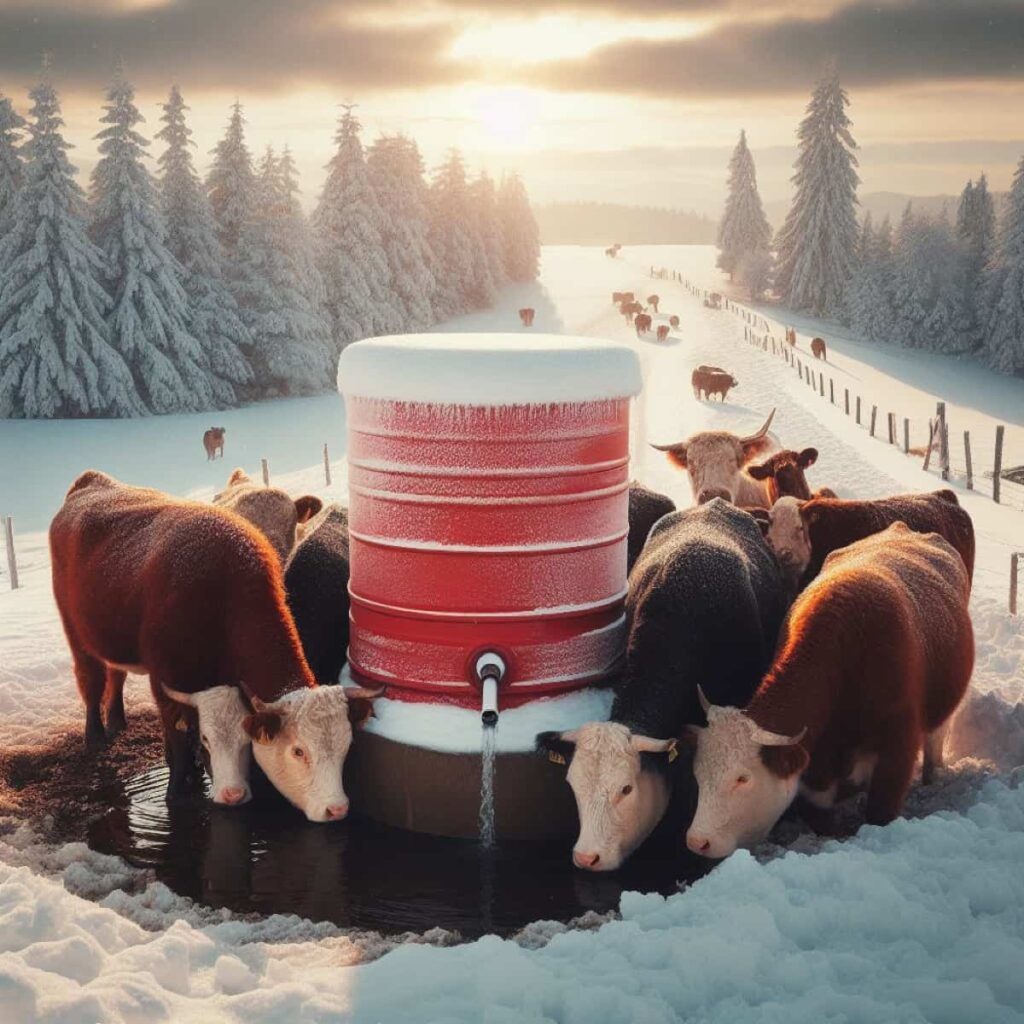
In cases of extreme cold, adding heating elements or utilizing waterers that automatically adjust the heating based on the temperature can be very beneficial. It’s also essential to ensure that the waterers are robustly constructed and securely installed to withstand extreme conditions, including strong winds and heavy snow, without getting damaged or overturned.
Ensuring Proper Drainage in Freeze-proof Cattle Waterers: Preventing Flooding and Contamination
Proper drainage is crucial in maintaining the functionality of freeze-proof cattle waterers and ensuring that the water remains clean and fresh. Ensuring that the waterers are installed in areas where water can easily drain away prevents flooding around the waterer, which could lead to muddy and unhygienic conditions.
Adequate drainage also prevents the buildup of stagnant water, which could become a breeding ground for pests and bacteria, leading to water supply contamination. Installing the waterers at a slight angle, ensuring that the overflow pipes are clear, and maintaining a slight slope on the ground where the waterers are placed can significantly enhance drainage and prevent water-related issues.
Understanding the Different Heating Mechanisms in Freeze-proof Cattle Waterers
Understanding the various heating mechanisms in freeze-proof cattle waterers is crucial in selecting and managing them effectively. Some waterers use electrical heating elements to keep the water warm. These elements can be submerged in the water or integrated into the walls of the waterer, providing consistent warmth to prevent freezing. Other waterers utilize passive heating methods, such as solar heat or geothermal energy, to keep the water from freezing without needing electrical power.
Additionally, some waterers are designed to minimize exposure to cold air, thereby reducing heat loss and maintaining the water’s temperature. A clear understanding of how each heating mechanism operates can guide you in choosing the most suitable and efficient waterer for your specific needs and conditions.
Top 15 Best Freeze-proof Cattle Waterers
| Type of Freeze-proof Cattle Waterer | Description |
| Insulated Automatic Waterers | Highly insulated waterers that automatically refill, conserving energy and ensuring a consistent water supply. |
| Heated Cattle Waterers | Equipped with heating elements, these waterers are ideal for extremely cold climates to prevent freezing. |
| Energy-Efficient Cattle Waterers | Designed to minimize energy use, these waterers are cost-effective and environmentally friendly. |
| Solar-Powered Cattle Waterers | Harness solar energy to operate, making them suitable for remote or off-grid locations. |
| Freeze-Resistant Cattle Waterers | Built with materials and designs that naturally resist freezing, reducing the need for additional heating. |
| Thermostatically Controlled Cattle Waterers | Feature thermostats to regulate temperature, ensuring water doesn’t freeze while saving energy. |
| Stainless Steel Cattle Waterers | Durable and rust-resistant, these waterers are long-lasting and easy to clean. |
| Large Capacity Cattle Waterers | Suitable for large herds, these waterers hold more water, requiring less frequent refilling. |
| Easy-to-Clean Cattle Waterers | Designed for simple and quick cleaning, promoting better water hygiene and easier maintenance. |
| Durable Cattle Waterers | Made with robust materials to withstand harsh weather and wear, ensuring longevity. |
| Gravity-Fed Cattle Waterers | Utilize gravity to supply water, reducing the need for mechanical parts and electricity. |
| Portable Cattle Waterers | Easily movable to support rotational grazing or changing pasture layouts. |
| Automatic Refilling Cattle Waterers | Automatically maintain water levels, reducing manual labor and ensuring constant water availability. |
| UV-Resistant Cattle Waterers | Designed to resist UV damage, enhancing durability and longevity when installed outdoors. |
| Low-Maintenance Cattle Waterers | Require minimal maintenance, making them convenient and time-saving for livestock owners. |
In case you missed it: Dairy Farm Operations Management: Month-Wise Maintenance for Better Profits
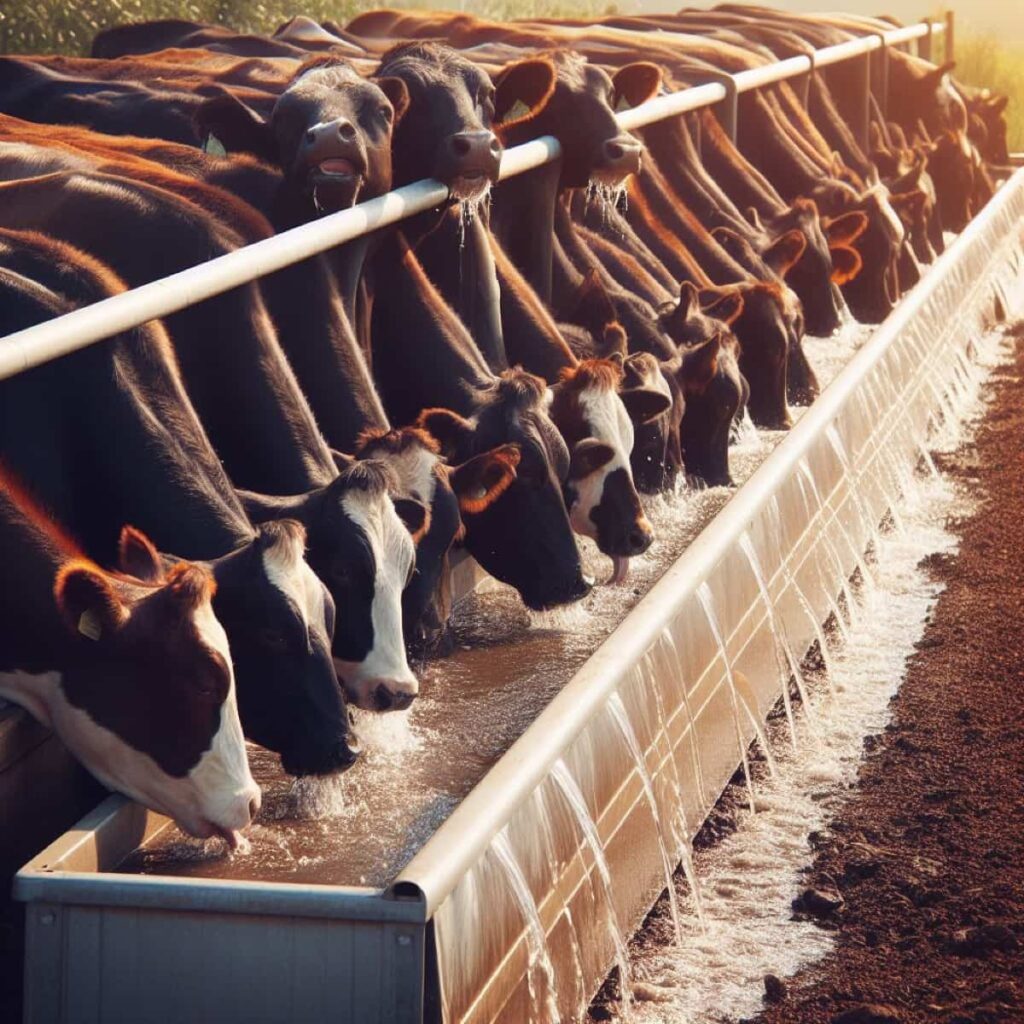
Conclusion
By considering factors such as insulation, heating mechanisms, durability, and ease of maintenance, farmers can ensure that their herds have reliable access to water in various weather conditions, promoting optimal livestock health and operational efficiency.
Frequently Asked Questions (FAQ) on Freeze-Proof Cattle Waterers
How Do You Keep Cattle Water from Freezing?
Ensure that the water troughs are well-insulated, and consider adding a heating element to maintain a consistent water temperature. Utilizing windbreaks and placing waterers in sunny locations can also prevent water from freezing.
Do Automatic Waterers Freeze?
Automatic waterers can freeze if not properly insulated or heated during cold temperatures. However, many are designed with built-in heating mechanisms and insulation to prevent freezing and ensure a consistent fresh water supply.
How Do You Make a Freeze-proof Water Trough?
A freeze-proof water trough can be created by incorporating insulated materials in its construction and installing a heating element. Positioning the trough in a sheltered area that receives adequate sunlight also helps prevent freezing.
How Do You Install Cattle Water?
Cattle waterers should be installed in accessible locations, ensuring all animals can easily reach them. Proper connections to the water source and electrical system (if necessary) should be established, following manufacturer instructions and safety guidelines.
- Aquaponic Farming at Home: A Step-By-Step Guide
- Profitable Village Farming Business Ideas in 2024
- High-Yield Aquaculture: Fast-Growing Fish for Farming
- Effective Fish Pond Construction Techniques for Beginners
- Irrigation and Water Management in Pineapple Farming
- Blossom to Harvest: Mastering Flowering and Pollination in Papaya Farming
- Pig Fattening Essentials: From Selection to Sale for Beginners
- Raising Wagyu Cattle: A Complete Guide for Premium Beef Production
- Soil Types and Their Water Holding Capacity
- Optimizing Irrigation Schedules for Coconut Groves for Enhanced Yield
- Espresso Your Garden: Coffee Grounds for Healthier Acid-Loving Plants
- The Best Soil Mix for Snake Plants: How to Mix Your Own Snake Plant Soil
- Green Thumb Success: Expert Tips for Cultivating Greenhouse Beans All Year Round
- Bloom All Year Round: The Ultimate Guide to Indoor Hyacinth Care
- Eco-Friendly Gardening: How to Make Liquid Fertilizer from Kitchen Waste
- Ultimate Guide to Grow Anise in Pots: Explore Seed Propagation to Harvesting
- Guide to Raising Chester White Pigs: Discover Breed Facts to Growth Management
- Mastering the Elegance: The Ultimate Guide to Weeping Cherry Tree Care, Planting, and Maintenance
- Ultimate Guide to Planting Garlic in Grow Bags: Growing Strategies for Beginners
- How to Fix Spider Plant Leaf-Related Problems: Natural and Organic Remedies
- 10 Reasons Why Your Tulsi Plant is Shedding Leaves: Home Remedies and Solutions
- Optimizing Growth and Yield: The Advantages of Palm Bunch Ash Fertilizer
- Utilizing Neem Oil Extract as a Natural Pesticide for Hydrangea
- From Soil to Harvest: Various Ways in Which Farmers Can Use AI Tools
- Steps to Encourage and Induce Citrus Flowers: A Comprehensive Guide
- How to Fix Snake Plant Leaf-Related Issues: Natural and Organic Remedies
- Transform Your Garden into a Fragrant Oasis with Raat Ki Rani (Night Blooming Jasmine)
- Discover the Ideal Chicken Breeds for Philippine Farms
- How to Create a Poultry Egg Farm Business Plan for Profits
- Grow Lemon Cucumbers Like a Pro: Insider Techniques for Bountiful Yields
- Ultimate Guide to Caring for Your Pink Princess Philodendron: Tips for Thriving Variegation
- Areca Nut Profit Per Acre: Calculating Yield and Cost of Cultivation
- How Kaveri Chicken is Becoming a More Profitable Breed in Indian Backyards
- Transform Your Barn: 9 Steps to Convert a Horse Stall into a Chicken Coop
- Exploring Suffolk Sheep Disadvantages with Limitations and Challenges
- Guide to Solving Potted Lemon Tree Problems: How to Revive Lemon Tree in Containers
